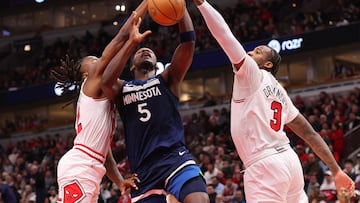NBA trade deadline: What is an expiring contract and why do some teams value them so much?
With the NBA’s trade deadline upon us, here’s a look at the intricacies of how player contracts work and why some of them carry more weight than others.


You’ve probably heard about expiring contracts in the NBA, but what you may not know is exactly what they are and why they can be the cause of serious concern for many franchises within the league. With that said, join us for the low down on how they work.
What is an expiring contract in the NBA?
It’s exactly as it sounds. When players are coming to the end of their contracts, we can say that it’s expiring and with that, a whole host of factors come into play. Before we get to those, however, it’s worth noting that in recent years value of large expiring contracts has begun to decrease. This, of course, is largely due to the fact that recent years have seen the NBA earn more in revenue, such that deals that are coming to an end have lost value. Remember, the NBA adheres to what can be considered a “soft” salary cap i.e., there are numerous ways in which teams can exceed it without being punished. What that has led to is teams placing less focus on expiring contracts as a means to gain an advantage. With that said, it’s all about timing, which is to say that just a few years ago a number of teams in the league were throwing around cash. Those deals are now coming to an end which means we could be in for some interesting times in the coming trade period.
Why are expiring contracts valuable in the NBA?
There are several reasons why expiring contract deals are coveted in the NBA. For starters, there is the financial aspect of it all. Expiring contracts can offer teams a little more wiggle room when it comes to future plans. How do they do that? In principle, when a player’s contract expires, it frees up salary cap space for the team, which in turn means that acquiring new players or re-signing existing ones is a whole lot easier. As you can probably guess, such flexibility can be crucial for teams that are hoping to upgrade their rosters or even sign high-profile free agents.
🚨 NBA TRADE DEADLINE 🚨
— Court Side Heat (@courtsideheat) February 5, 2024
The Celtics, Mavericks, Lakers, and Suns are all interested in Andre Drummond #NBA #NBAX #SeeRed pic.twitter.com/l7Due1X3ma
Related stories
Then, there is also the fact that such contracts can be used as trade assets. Teams can use players with expiring contracts as bargaining chips when they seek to acquire players. Indeed, this is of particular interest to those who are attempting to rebuild or restructure their rosters. Last but not least, expiring contracts can be of great use when it comes to navigating the league’s complex salary cap rules. From helping teams stay below the NBA’s luxury tax limit to creating trade exceptions, the value of these contracts can’t be overstated. What’s more, is that they can also provide additional flexibility when it comes to roster management and finance allocation. In summary, expiring contracts give teams more flexibility, assets in trade deals, and a strategic advantage in the context of the league’s salary cap rules.
OK, but how do expiring contracts work in the NBA?
Assume for a moment that we have a player who plays for Team A and is in the final year of his deal, is owed $20 million, and will become a free agent when it’s all over. If he’d like to be traded, he must first receive equivalent value, but that will only be calculated for the current season. What that means, is that he can be traded for another player who is entitled to $14 million, or even a third who should receive $6 million, regardless of whether both players are under contract for upcoming seasons. Indeed, even if both players are worth more than our original guy, a team can still make a deal due to the fact that his expiring contract will alleviate $20 million for the coming season, an amount that can be used in free agency or to resign an existing player. Now you know.

